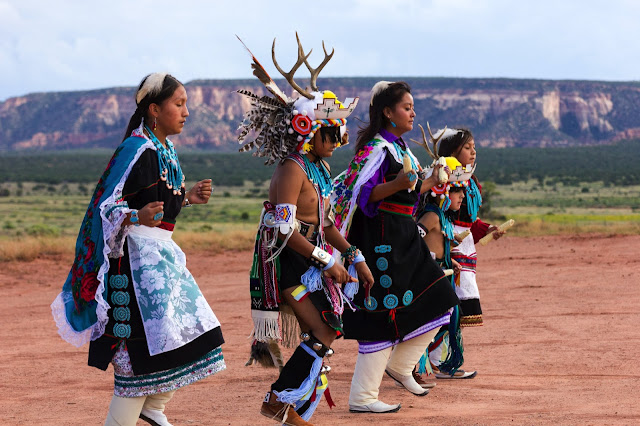Early-Voting Advances in South Dakota—Montana Up Next
For the first time, Cheyenne River Sioux Reservation voters
will be able to early-vote in a national election in Eagle Butte, their capital
and population center. This year, those wishing to cast a ballot ahead of Election
Day will drop by the office of chairman Kevin Keckler. Previously, they had to
travel long distances to a primarily white-populated town.
“We sat down with the county auditor [the official
who supervises voting in South Dakota counties], figured out how it would work, and now early
voting and registration are available in the tribal hall, with a tribal member
deputized to supervise the process,” said Wayne Ducheaneaux, tribal administrative
officer. “We were able to come to an agreement quickly.”
“Dewey County is the gold standard in South Dakota tribal-county
relations,” said O.J. Semans, Rosebud Sioux director of the voting-rights
nonprofit Four Directions, which has supported, negotiated or litigated all the
recent advances in South Dakota Native suffrage. “The county has been not just cooperative
but cost-effective, because they don’t require their staff to travel to the
reservation every day.”
On the Rosebud Sioux Reservation, early voters are casting
ballots in a now-permanent satellite early-voting office in a government
building in Mission, said Rosebud Sioux business manager and tribal member Rose
Cordier. (For more on Rosebud’s path
to early voting, see “Ballot Box Breakthrough in the Badlands,” Indian Country Today Media Network, March
15, 2012.)
For the Crow Creek Sioux Tribe, this year’s early
voting is in the tribal-council chambers, in the reservation’s population
center in Fort Thompson. This is a step up from some voting locations tribal
members have had to use in the past, including a dirt-floored structure that
appeared to be a disused chicken coop, said Buffalo County Commissioner Donita
Loudner, a Crow Creek tribal member.
“The tribe and Chairman Brandon Sazue bent over
backward to provide a safe, secure, convenient location,” said Semans. His
group, Four Directions, paid for Crow Creek’s satellite-office expenses because
the state refused to provide HAVA funds.
Crow Creek’s path to voting rights has not been easy,
said Loudner. Until 2004, Buffalo County, where most tribal members lived,
packed almost all of its Native population into one district and divided the
remainder among two more districts such that Native people did not form a majority
in either. This impacted their ability to elect officials of their choosing. An
ACLU lawsuit resulted in a settlement that redistricted the county and placed elections
under federal supervision.
“This is the first year we won’t have federal
monitors,” said Loudner. “I will have an attorney here to answer questions,
though. This person will be able to help registered voters exercise their
rights.”
Now, several opinions issued by U.S. District Court
Chief Judge Karen Schreier indicate that Pine Ridge will likely have early
voting until 2018. In early October, for example, the judge denied a motion to
dismiss the case by the defendants—South Dakota Secretary of State Jason Gant and
county elections officials.
This was despite Gant releasing Help America Vote Act
money to pay for elections on Pine Ridge. Before the suit was filed, he had
required impoverished Shannon County, a non-tribal entity within Pine Ridge
that is responsible for national elections there, to pay upfront then request a
reimbursement. Shannon County didn’t have the funds, so an impasse ensued.
Gant’s action solves the financial crisis for now.
However, in 2018 HAVA funds run out, and again there will be no clear way to pay
for Pine Ridge elections. “The harm may recur,” wrote the judge.
The judge also kept the case alive, despite promises of
full Oglala enfranchisement by Fall River County officials, whom barebones
Shannon County hires to handle Pine Ridge elections on a freelance contract
basis.
Mostly white Fall River County’s supervision of Pine
Ridge elections has made them subject to special Justice Department scrutiny.
On Pine Ridge, voter intimidation, requests for forms of ID that were not
required, dropping of qualified voters from the rolls and the like were common
for years. In 2010, Fall River officials quit their freelance posts on the eve
of the election, jeopardizing it.
A recent agreement with the Justice Department says,
among other things, that election workers must provide legally required
language assistance and may not insult voters. During the March 2012 hearing
before Judge Shreier, the Fall River state’s attorney characterized the Justice
Department and its oversight as “malicious.”
The Oglala plaintiffs are represented by Sioux Falls
attorney Steven D. Sandven, a former Oglala Sioux Tribe Attorney General and
Special Assistant to the U.S. Attorney for prosecution of non-Native offenders
in Indian country. He calls enfranchisement “the most fundamental right.”
Sandven noted that the Oglala lawsuit concerns vote
denial—when the totality of a situation means certain groups have a more
difficult time getting to the polls than others—as opposed to vote dilution, as
might occur in a gerrymandering case. He added that a recent federal-court
decision established precedents that pertain to vote denial. “The judge in
the 11th Circuit applied a practical, common-sense test that asks, ‘Is it
harder for some folks to vote than others?’”
A trial date has not yet been set.
“Voting rights have been fought in the South since
the 1960s,” said Semans. “The process is only now gathering momentum in Indian
country.”
In the Northern Plains, changing demographics may drive
white fear of Native voting, as white populations decline, white towns empty
out and Native populations grow and develop. Said Sandven: “It’s math. Very
soon, we won’t be a swing vote, we’ll be the
vote, and that’s scary to some.”
Montana Rematch
Voting-rights group Four Directions has efforts
underway in several Western states, most recently in Montana, where a Native
early-voting lawsuit will be heard October 29 at 11 a.m. in U.S. District Court
in Billings. Four Directions has been advising the plaintiffs, who are tribal members
from the Northern Cheyenne, Crow and Fort Belknap reservations.
They filed suit after protracted and unproductive
negotiations for early voting with Montana’s top elections official, Secretary
of State Linda McCulloch, and the relevant counties. Not being able to
early-vote and late-register on their reservations is unconstitutional and
illegal, the plaintiffs say. (For more, see “Montana Tribes Demand Equal Access
to Early Voting,” Indian Country Today
Media Network, October 10, 2012.)
On the 29th, some of the attorneys will be
fresh from the Oglalas’ early-voting litigation in South Dakota. Sandven is on
the Native plaintiffs’ legal team, which is headed by Montana lawyer Terryl
Matt. Meanwhile, the county officials named as defendants have retained Sara
Frankenstein, who is representing the defendants in South Dakota.
Text c. Stephanie Woodard; photographs c. Joseph Zummo.

